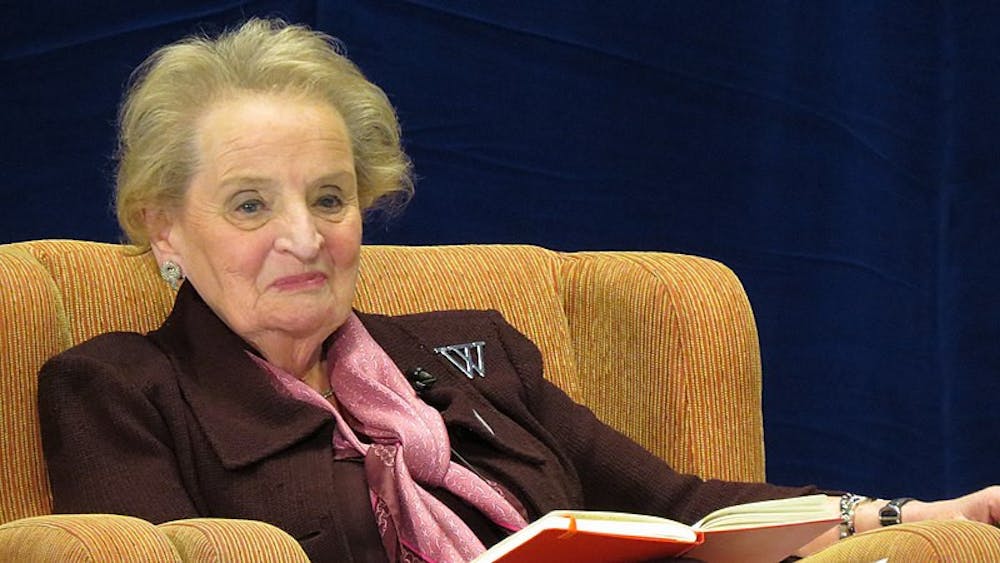The Center for Global Health (CGH) hosted a seminar featuring former Secretary of State Madeleine Albright on Sept. 23 as part of its “Women in Global Health: Exploring Non-Academic Careers” series. The event was moderated by CGH Assistant Director Anna Kalbarczyk and focused on Albright’s career and her struggles as a woman in politics.
Albright attended Wellesley College and the Hopkins School of Advanced International Studies before completing her PhD at Columbia University, where she balanced her responsibilities as a mother and a student.
She argued that women have many inherent strengths, including more empathy, awareness and a willingness to cooperate.
After college Albright worked as the chief legislative assistant for Maine Senator Edmund Muskie and the congressional liaison for the National Security Council, where she worked to establish a place for women in the workforce.
“I had my credentials together just at the time in the ‘70s and ‘80s when people were looking for a woman to have on staff,” she said. “I had an advantage in some ways, but I often ended up being the only woman in the room.”
Albright explained that being the only woman can make it harder to speak up, but that it is imperative for women to do so anyway. She admitted that she herself had been intimidated when she first became the U.S. ambassador to the United Nations (UN).
“I end up at the UN, and I am the only woman on the Security Council, representing the United States, and 14 men are sitting there glaring at me,” Albright said. “I thought, ‘Well, I won’t speak today, I’ll just wait to see if they like me and who is who.’ Then I looked at the sign that said the United States, and I thought, ‘If I don’t speak today, the voice of the United States will not be heard...’ It’s an act of will to speak up.”
Despite being a UN ambassador, Albright shared that she never expected to become the secretary of state. Many people in Washington D.C. questioned her ability to work with Middle Eastern countries as a woman, despite her accomplishments in the UN.
Even when she was made the first female Secretary of State by President Bill Clinton, Albright reported that she was still questioned by her peers.
“I was condescended to even though I was Secretary of State,” she said. “I had more problems with the men in our own government [than other governments], and not because they were male chauvinist pigs, but because they had known me too long, so they knew when I made dinner at my house or was the carpool mother, and they thought, ‘How did she get to be secretary of state?’”
Albright admitted that she has often worried about her ability to balance work and her family, although she hopes she has done a good job.
She also argued that while politics have certainly come a long way for women in the past few decades, no such victory is ever permanent.
“Younger women... have to understand that things can be pushed back. Not everything is getting better all the time,” Albright said. “We have to be very, very vigilant.”
Additionally, Albright stressed that women have a responsibility to support other women, referencing her famous quote, “There is a special place in hell for women who don't help other women.”
“We need to be more supportive of each other and not so judgmental,” she said. “The best thing is to have more than one woman in the room... so there really is some way to support each other, because that’s what men do.”
Julie McCaw, a pediatric critical care fellow at the School of Medicine, told The News-Letter in an email that she appreciated hearing Albright talk about her struggles.
“It was refreshing to hear her... [admit] that balancing a family and a career in global health is difficult, and that women should be forgiving of themselves but still strive to ‘do it all’ as she has,” she wrote. “[There were] many memorable moments that I will hold onto for inspiration.”
Doctoral student Caitlin Gould also reported that she loved Albright’s message.
“Knowing that you can do it all and there’s no one prescriptive formula about how to be a successful woman with a high-powered career, who also manages to get a doctorate, have a family and seems pretty happy with a supportive spouse... It was so inspirational,” she said. “I really needed, personally, to hear a message like that.”





